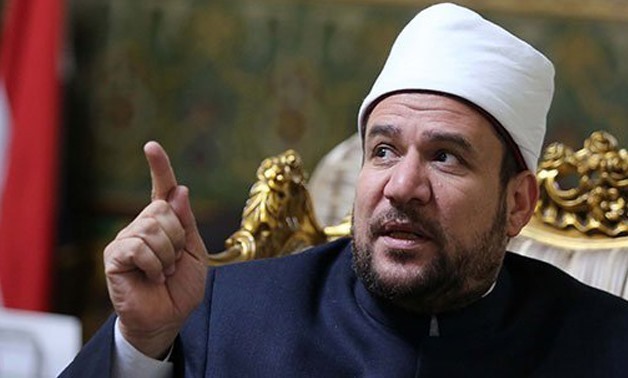
FILE - Mohamed Mokhtar Gomaa, Minister for Endowments and Religious Affairs, undated
CAIRO – 11 March 2018: Minister for Endowments and Religious Affairs Mohamed Mokhtar Gomaa urged Egyptians to participate in the forthcoming presidential election as part of the “national duty”, on Sunday.
In his speech in a seminar dubbed “The role of youth in building the community” at Cairo University, Gomaa said that there are those in the West who claim that Arabs are not ready for democracy, and are unable to implement it.
“They accuse Arab countries of backwardness and negativity,” Gomaa added. “We, people of the Islamic and Egyptian community, should act as role models for modernity and positivity,” adding: “participation in the next election represents a democratic requirement, an aspect of civilization, a religious demand and a national duty.”
Gomaa, however, warned of using mosques for any political purpose. In February, he clearly stated that mosques will not be used as proponents for the interests of specific persons or parties, or for electoral propaganda, as mosques should call only for God.
Similarly, the Catholic, Orthodox and Protestant churches in Egypt have affirmed their neutrality in the election, said Andrea Zaki, head of the Evangelical community, on February 4.
Zaki pointed out that Pope Tawadros instructed churches to refrain from partaking in any kind of propaganda or the hosting of seminars, while simultaneously stressing the need to participate in the electoral process.
Calling to boycott the 2018 presidential election, lawyer Hassan Hussein has been arrested with charges of joining an illegal group that aims to obstruct state institutions from carrying out their duties. Hussein is also charged with using social media to incite terror attacks. Hussein started a social media page translated as “Positive boycott of the presidential election.”
In January, five political figures, including Hussein released a joint statement calling for Egyptians to boycott the election claiming a lack of political challenge.
The figures include former member of the outlawed Muslim Brotherhood and chairman of Strong Egypt Party, Abdel Moneim Aboul Fotouh; former parliament member and chairman of the Reform and Development Party Mohamed Anwar Al-Sadat; former science consultant for the presidency Essam Heggy; former chairman of the Central Auditing Authority Hisham Genena; and political science professor Hazem Hosni.
In February, Egypt’s Attorney-General Nabil Sadek ordered the confiscation of assets belonging to Aboul Fotouh and 15 others.
Although Moussa Mostafa Moussa, chairperson of Al-Ghad party, announced running for president in late January, Hamdeen Sabahi, the founder and leader of the Egyptian Popular Current and the one who ran solely against Sisi in 2014’s presidential election, called for the boycott of the 2018 election, claiming it is “an election without candidates or guarantees.”
Samir al-Khouli, assistant secretary general of the Egypt Support Coalition accused Sabahi of attempting to deter people from voting in order to embarrass the country and confuse the public. “Your malicious remarks are exposed,” Khouli said referring to Sabahi.

Comments
Leave a Comment